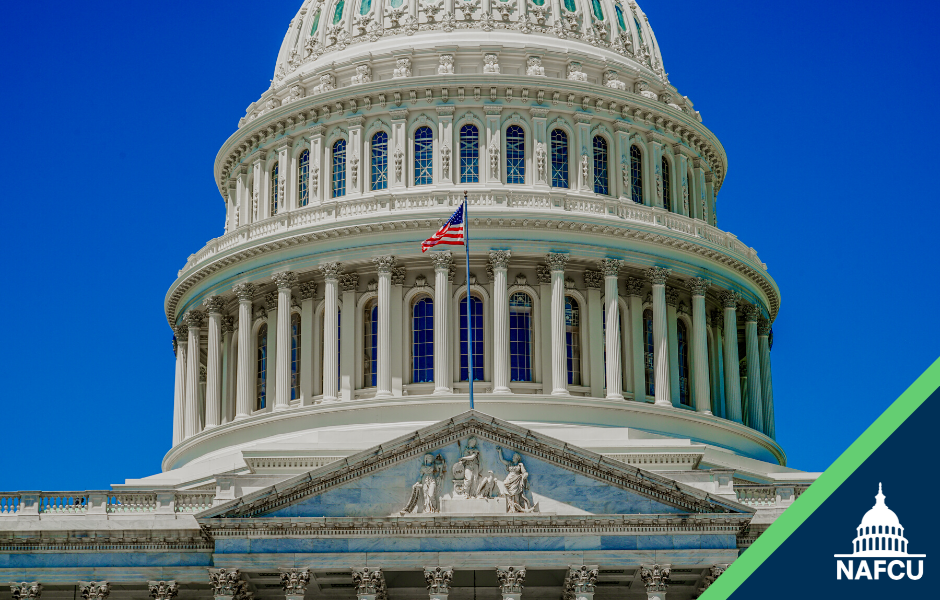Newsroom
NAFCU urges lawmakers to see through bankers’ false narrative on mergers; calls for Modern Glass-Steagall to protect consumers
 NAFCU President and CEO Dan Berger Tuesday broke down facts for lawmakers ahead of today's House Financial Services Subcommittee on Consumer Protection and Financial Institutions hearing to examine financial services industry consolidation, competition, and technology in response to the American Banker Association's (ABA) testimony misrepresenting voluntary bank-credit union mergers.
NAFCU President and CEO Dan Berger Tuesday broke down facts for lawmakers ahead of today's House Financial Services Subcommittee on Consumer Protection and Financial Institutions hearing to examine financial services industry consolidation, competition, and technology in response to the American Banker Association's (ABA) testimony misrepresenting voluntary bank-credit union mergers.
"It is ironic that ABA is claiming the credit union tax exemption is a ‘new factor’ in banks looking to merge with credit unions," said Berger. "Mergers between banks have been occurring at a significantly higher rate with 5,000 mergers between banks occurring since 2003. Just yesterday, the Wall Street Journal examined bank merger data and found that bank to bank mergers were on track to hit the highest level since the financial crisis. ABA should tell policymakers the truth on why their industry is consolidating.
"During the hearing, we call on policymakers to look past the rhetoric by the banks and instead focus on how the banking industry can be safer for consumers. In their efforts to make profits, banks have ignored consumer protection laws resulting in $243 billion in fines since the financial crisis," concluded Berger. "Policymakers should consider creating a modernized Glass-Steagall Act in order to protect consumers and taxpayers from banks that are ‘too big to fail.’”
In addition, NAFCU's Brad Thaler wrote to the subcommittee Tuesday to further outline where bank lobbyists inaccurately represent these voluntary mergers.
In the letter, Thaler, NAFCU vice president of legislative affairs, noted that, contrary to what the banking trade association's say, bank and credit union mergers are typically a win-win for a local community that may lose its community-focused financial services, or even local employees and branches, if a mega-bank buys the local community bank.
"Credit union-community bank mergers often mean employees retain jobs and branches remain open with a focus on the members in the community," wrote Thaler. “These mergers also cannot occur without approval from both bank and credit union regulators."
Thaler explained that while banking industry trades have used the topic of mergers to attack the tax status of credit unions, they fail to explain that "these mergers are often purchase and assumption transactions and are subject to taxation at the bank level." Moreover, the credit union involved with the merger pays many of the taxes, such as local property taxes and payroll taxes, when the former bank remains open as a credit union.
"They also fail to point out that nearly one-third of all banks are Subchapter S corporations and do not pay corporate income taxes themselves," wrote Thaler. "These annual tax breaks for banks far outpace the annual tax expenditure of the credit union tax exemption."
In addition to responding to the bankers, Thaler outlined several of NAFCU's priorities under review by the subcommittee, including regarding regulation of fintechs, opposition to NCUA gaining third party vendor authority, the need for relief for de novo credit unions, support for all credit unions being able to add underserved areas, and support for the Credit Union Governance Modernization Act, H.R. 2311, which would make it easier for credit unions to expel members who threaten the credit union. Read the full rebuttal here.
Share This
Related Resources
Add to Calendar 2024-06-26 14:00:00 2024-06-26 14:00:00 Gallagher Executive Compensation and Benefits Survey About the Webinar The webinar will share trends in executive pay increases, annual bonuses, and nonqualified benefit plans. Learn how to use the data charts as well as make this data actionable in order to improve your retention strategy. You’ll hear directly from the survey project manager on how to maximize the data points to gain a competitive edge in the market. Key findings on: Total compensation by asset size Nonqualified benefit plans Bonus targets and metrics Prerequisites Demographics Board expenses Watch On-Demand Web NAFCU digital@nafcu.org America/New_York public
Gallagher Executive Compensation and Benefits Survey
preferred partner
Gallagher
Webinar
Add to Calendar 2024-06-21 09:00:00 2024-06-21 09:00:00 The Evolving Role of the CISO in Credit Unions Listen On: Key Takeaways: [01:30] Being able to properly implement risk management decisions, especially in the cyber age we live in, is incredibly important so CISOs have a lot of challenges here. [02:27] Having a leader who can really communicate cyber risks and understand how ready that institution is to deal with cyber events is incredibly important. [05:36] We need to be talking about risk openly. We need to be documenting and really understanding what remediating risk looks like and how you do that strategically. [16:38] Governance, risk, compliance, and adherence to regulatory controls are all being looked at much more closely. You are also seeing other technology that is coming into the fold directly responsible for helping CISOs navigate those waters. [18:28] The reaction from the governing bodies is directly related to the needs of the position. They’re trying to help make sure that we are positioned in a way that gets us the most possibility of success, maturing our postures and protecting the institutions. Web NAFCU digital@nafcu.org America/New_York public
The Evolving Role of the CISO in Credit Unions
preferred partner
DefenseStorm
Podcast
AI in Action: Redefining Disaster Preparedness and Financial Security
Strategy
preferred partner
Allied Solutions
Blog Post
Get daily updates.
Subscribe to NAFCU today.
